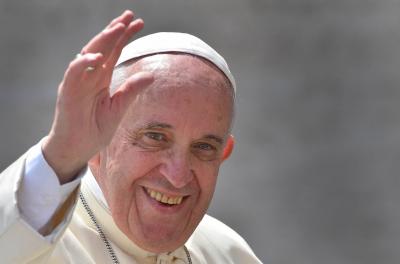Pope at WFP: Must combat desensitisation, bureaucracy

ROME -- In a visit to the World Food Programme on Monday, Pope Francis laments the world we live in, where “wars are fed, people are not” and talked about the importance of the work that the WFP are doing, reminding us that we have become desensitised to hunger and poverty around the world and must open our eyes to combat it.
Speaking to the executive board of the United Nations World Food Programme in Rome at their 2016 annual meeting he expressed his gratitude for the board’s “many efforts and commitments in service of a cause that challenges us all: combatting the hunger from which so many of our brothers and sisters are suffering.”
He then went on to highlight the technological world we live in saying, “We live in an interconnected world marked by instant communications. Geographical distances seem to be shrinking. We can immediately know what is happening on the other side of the planet,” and to warn of its dangers, “Paradoxically though, this apparent closeness created by the information highway seems daily to be breaking down. An information overload is gradually leading to the “naturalization” of extreme poverty. In other words, little by little we are growing immune to other people’s tragedies, seeing them as something “natural”.”
He highlighted the fact that “all those human lives turn into one more news story.” Though he stressed that, “We need to “de-naturalize” extreme poverty, to stop seeing it as a statistic rather than a reality. Why? Because poverty has a face! It has the face of a child; it has the face of a family; it has the face of people, young and old. It has the face of widespread unemployment and lack of opportunity. It has the face of forced migrations, and of empty or destroyed homes.”
The pontiff then continued by warning against passivity and bureaucratisation: “We cannot simply say that their situation is the result of blind fate and that nothing can be done about it. Once poverty no longer has a face, we can yield to the temptation of discussing “hunger”, “food” and “violence” as concepts, without reference to the real people knocking on our doors today. Without faces and stories, human lives become statistics and we run the risk of bureaucratizing the sufferings of others. Bureaucracies shuffle papers; compassion deals with people.”
He was keen to denounce the myth that food shortage could be something natural, damning it as “due to a selfish and wrong distribution of resources, and to the ‘merchandising’ of food.” He blasted “the consumerism in which our societies are immersed [that] has made us grow accustomed to excess and to the daily waste of food.”
He then moved onto the problem of “debureaucratising” hunger, mentioning the current instability of the world situation, with “war and the threat of war uppermost in our minds and our discussions.” As such, he said, “arms seem to have gained unprecedented importance,” with “this approach so deeply engrained and taken for granted that it prevents food supplies being distributed in war zones.”
“Those who are most vulnerable not only suffer the effects of war but also see obstacles placed in the way of help. Hence it is urgent to debureaucratise everything that keeps humanitarian assistance projects from being realised,” he urged again. He then went on to talk of the work done by the WFP and his hopes that all nations would work with them and use them as an example of aid work in action that works.
“The Catholic Church, in fidelity to her mission, wishes to cooperate with every initiative that defends and protects the dignity of persons, especially of those whose rights are violated. In implementing this urgent priority of “zero hunger”, I assure you of our complete support and encouragement for the efforts in course. “I was hungry and you gave me food; I was thirsty and you gave me something to drink”,” he promised to end.
ch


